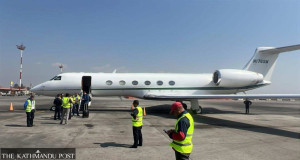National
Digital identification to be assigned during birth registration
As distribution of national ID cards falls behind, they are yet to be made mandatory for public services.
Prithvi Man Shrestha
The government will maintain the digital identity of its citizens starting from early childhood as it starts assigning national ID numbers to children during birth registration.
The Department of National ID and Civil Registration has started issuing such digital numbers to pave the way for wider adoption of the national identity cards that could replace citizenship certificates in the future.
The national ID is a federal identity card issued by the Department of National ID and Civil Registration with a unique number assigned to each person. Nepali citizens can obtain the cards based on their biometric and demographic data. The card features a unique number, photo, personal information and the bearer's fingerprints.
The department claims that the biometric smart card will have several uses and that officials can read it using secure terminals.
To ensure eligibility for the national ID, the government will identify a Nepali by a unique number created during birth registration at the ward level, according to department officials.
“We have been informally providing national ID numbers to people at their birth registration across the country for the past two months,” said Mukesh Kumar Keshar, director at the Department of National ID and Civil Registration. “Such numbers are being given to around 2,000 people a day.”
The department will formally launch this plan within a few weeks. “When a person’s identity is created from early childhood, it will be easier for such persons to get government documents, including the national ID,” he added.
Along with the initiative, the government plans to speed up the national ID card distribution.
The government issued the national ID card in 2018. In November that year, then-home minister Ram Bahadur Thapa launched the distribution of national identity cards in Panchthar district by handing over the first card to the 101-year-old Bhagawati Devi Bhandari of Phidim Municipality-4. It was done as part of a pilot programme funded by the Asian Development Bank to distribute digital identification cards in the eastern district and for the Singha Durbar staff.
Now the department says it has already enrolled 14.1 million people to the national ID database, completing the process for over 90 percent of the total eligible population. During the enrollment, vital data of individuals is taken.
The country has 29.16 million people as per the 2021 census conducted by the National Statistics Office.
“Now our priority is to distribute the cards after first focusing on enrollment,” said Keshar. “We have already printed three million cards. Of them, 1.8 million have been delivered to the District Administration Offices for distribution.”
According to the department, it has so far distributed around 350,000 cards and it plans to expedite the process through a campaign. While the government was distributing the national ID cards through the District Administration Offices, it has now started distributing them via wards offices of the local governments.
“Starting March 3, we are distributing the national ID cards at the ward level from Kanchanpur district,” said Keshar. “There are 172,000 cards allocated for the district.”
Keshar said that distribution of cards would be initiated in other districts as well very soon.
But despite efforts to ensure wider adoption of the national ID card, people have not been able to use it to get various government services. For example, one needs to show the citizenship certificate to get a driving licence and to participate in exams given by the Public Service Commission. As per Section 3 of the National Identity and Civil Registration Act-2019, the government will enforce the use of national ID in designated districts by publishing a notice in the Nepal Gazette.
“As only a limited number of people have access to national ID cards, the government has not made its use mandatory,” said Yubaraj Kattel, director general at the department. “But there is a plan to do so soon.”




 9.88°C Kathmandu
9.88°C Kathmandu















